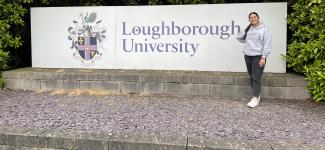Are you a UBC undergrad thinking about going on a student exchange? It can be a daunting decision. You might wonder, what’s it like spending a year or a semester in another country? How can you prepare? And how do you handle it when things go sideways? We talked with students who studied abroad on a Go Global program. They spoke with us candidly, sharing their personal impressions, fears and misgivings, best memories, top tips and advice.
Meet Victoria McMahon, an Indigenous student from Barrie, Ontario, who is a member of the Deninu Kųę́ First Nation of the Northwest Territories. Last year, McMahon spent a semester at England’s Loughborough University, a small university town in the East Midlands. She graduated from UBC in May 2024 with a bachelor’s in kinesiology (Faculty of Education) and recently won the prestigious Chevening Scholarship for a fully-funded master’s degree in Creative Health at University College London beginning this September.
Before you go
Why did you pick Loughborough University? How did you hear about it?
There was a student a few years ahead of me who did her UBC exchange there and Go Global has a specific partnership with Loughborough University for kinesiology students, so that immediately caught my eye. At first, I was very interested and chose to study at the University of Hawa’ii. But I eventually switched to Loughborough University because I wanted to be in Europe and have the ability to travel. I chose England as well because they speak English, so I knew it would be an easy transition there.
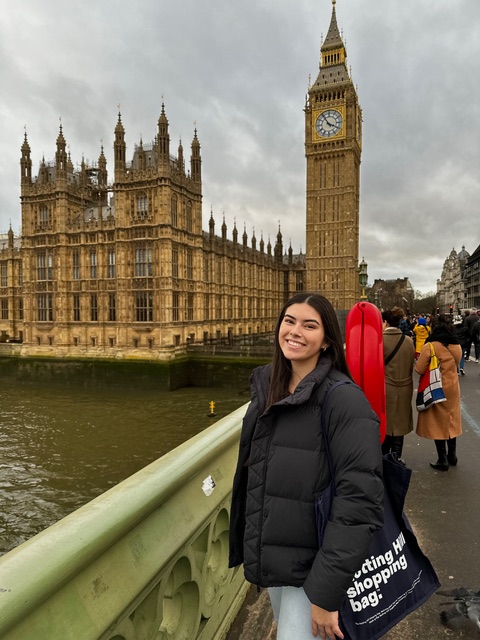
Victoria in front of London landmark, Big Ben, January, 2023 (photo: Karen McMahon)
What was the application process like? Any tips?
It wasn’t too difficult. From what I remember, I wrote a paragraph for each of my top three school choices. I changed what I said for each one, of course, because each university offered something different. For the University of Hawa’ii, for example, I spoke about learning from the Indigenous groups there and specific courses that interested me. As far as tips, it’s free to apply for Indigenous students*, so that removes the cost barrier. In my experience, I did a bit of research on my top three schools I was choosing and looked at scholarships that were university or country-specific to give me the most options, so I was thinking ahead in that sense. I also watched YouTube videos to get the student perspective.
How did you prepare? Anything to be aware of? (travel, cultural differences, classes, etc.)
I’m a pretty organized person. But in the UK, and specifically at Loughborough University, they do some things later than I was used to here—especially because I was going later in semester 2. It took a long time to get my student number from the advisor, which delayed me applying for housing. Because of that, when I was preparing to go to England just two months before arriving, I still didn’t have my accommodation arranged. That really stressed me out. Course selection didn’t happen for a long time and I didn’t have my time table til a month before moving. It’s a waiting game. After that, I learned not to stress about it. Just make sure you stay up to date with your Go Global advisor and with your advisor at the institution overseas, and email quite frequently so you are aware of what’s happening and the timelines.
What worries did you have beforehand? How did you overcome the anxiety?
Making friends while I was on exchange—because I knew that the school I chose was small (14,000 students) compared to UBC and didn’t have a lot of exchange students. And, I was going half-way through the year and figured everyone would’ve already met at the beginning of the year. Though it was weird as a fourth-year student living in a first-year dorm, I decided to live in the university accommodation. They have a shared dining hall and each accommodation has its own, so I had to overcome my fear of going alone quickly. I had to push myself to talk to new people. Luckily, I found people to help me on my first day. They helped me get an app to find my timetable, too. It was really brutal my first few days, but the dining hall helped a lot, and I was able to find other exchange students through that as well. I met someone from Canada in the dining hall and we ended up becoming best friends. It was sometimes embarrassing starting up conversations with strangers, but in the end, it worked out for me.
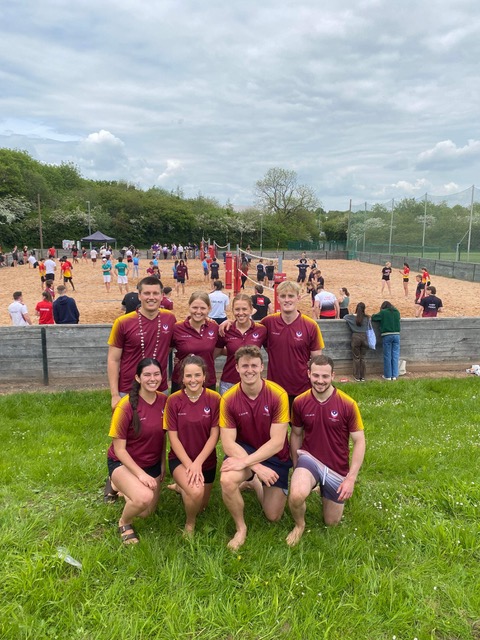
Team Faraday at the Loughborough University beach volleyball one-day event in May 2023 (photo: Keiran Mangan)
During the experience
How was the overall experience? What did you learn?
Because it’s a very different experience than UBC and living in Vancouver, it was a nice change. I enjoyed the small university-town vibe. And, it was easier to make friends in that sense: all the university students go out in town. The campus was large—the largest in England—and in one area, not split up. The university had a lot of clubs, as well, and it was really easy to meet people that way.
I learned that classes are organized much differently than at UBC and in Canada. I really liked how the courses there were set up. Most were 30 percent course work and the other 70 percent for the final exam. I liked that because it gave me an opportunity to travel throughout the year, then study hard at the end. All lectures are recorded, and that’s super helpful to go back if I were sick or needed to review something; that way, you can keep up with the class work. My semester abroad also helped me develop more self-confidence, independence and the ability to talk to people. When away, I had to push myself out of my comfort zone. I find it a lot easier to start conversations with new people because I had to do it so many times when I was in England.
QUOTE: "I have friends everywhere now and that’s something I didn’t have before."
If you could change something or do it differently, what would you change or do?
I would’ve asked more questions of my advisors at the beginning, especially about getting involved in (university) clubs. I wish I would’ve started sooner and pushed myself to join quicker. Sports were easy to access: intramural teams at different skill levels. Loughborough also had one-day events, for example, a beach volleyball tournament. They were all free for students and really fun. I met other students who lived in residence at those one-day events.
How were the academics?
A lot easier than at UBC. My courses were second-year courses and I was a fourth-year student. I found it a lot easier because I had learned some of the material at UBC before, and, because there were no assignments throughout the year (we have quite a lot at UBC), it was a lot easier to manage. I only took three courses, too, so that also made it more manageable.
How was the social aspect?
Easygoing because it’s England and the pub culture is really big over there. I quickly made friends within my residence. We’d go out on sports night to watch the rugby game and then go out after at the student union. During the week, there was a lot of socializing in town.
I also got to travel around Europe. The school is situated with an airport nearby, but most of the flights are for holiday, so to travel to other countries, you have to go to major airports in bigger cities first. That meant most British students didn’t go away on weekends. However, because we all had the whole month April off, the exchange students and I used the entire month to travel as a group. We went to Belgium, Sweden and Denmark together. In addition, I had a friend from UBC Okanagan at University College in London, so we travelled together to Edinburgh, Amsterdam and Northern Ireland.
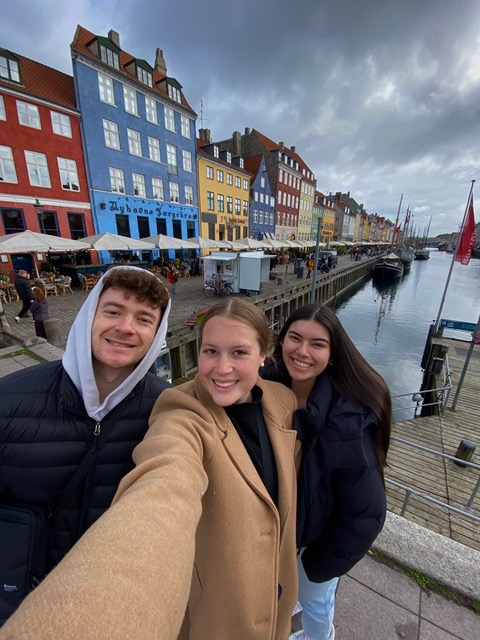
Left to right: Keiran Mangan, Taylor Sibernagel and Victoria McMahon in Copenhagen, Denmark, March 2023 (photo: Taylor Sibernagel)
After the experience
Would you recommend this experience to others? What can they look forward to?
Yes! I had never travelled outside of North America before. I recommend an exchange experience to all students because it’s such a unique opportunity to see the world in this way. Studying at Loughborough University opened my eyes to pursuing a master’s and applying for the Chevening Scholarship. I know cost can be an issue, there are lots of funding opportunities students can look into through Go Global.
You can look forward to meeting new friends! The friendships formed on exchange will last a lifetime. Since moving home, I’ve seen three of my exchange friends since being back in Canada. I have friends everywhere now and that’s something I didn’t have before. I’m going back to England now for my master’s and I’m excited to go visit my friends at Loughborough University.
What was the impact on your academic and personal development?
Personally, developing a greater sense of independence; academically, enjoying a change of pace, which was nice. Having to work on group projects with first years was new. My entire group didn’t know how to do references, so I had to take initiative and be a leader in the group. I felt like (group work) taught me patience and collaboration skills. It was interesting to learn first-hand that they have different ways they do things academically that aren’t the same in North America.
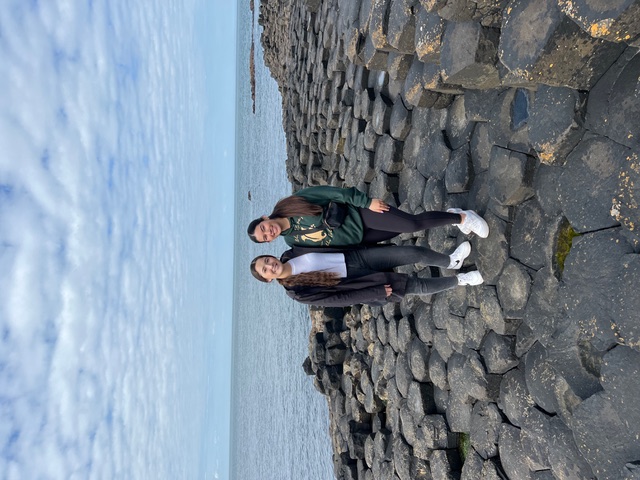
Left to right: Dylan Miller and Victoria McMahon at Giant’s Causeway in Northern Ireland, April 2023 (photo: courtesy of Victoria McMahon)
*Students who self-identify as First Nations, Métis or Inuit are eligible to have their Go Global application fee waived.
Read more Go Global student stories.
See our Indigenous Global Connections page to find special programs for Indigenous UBC students.
